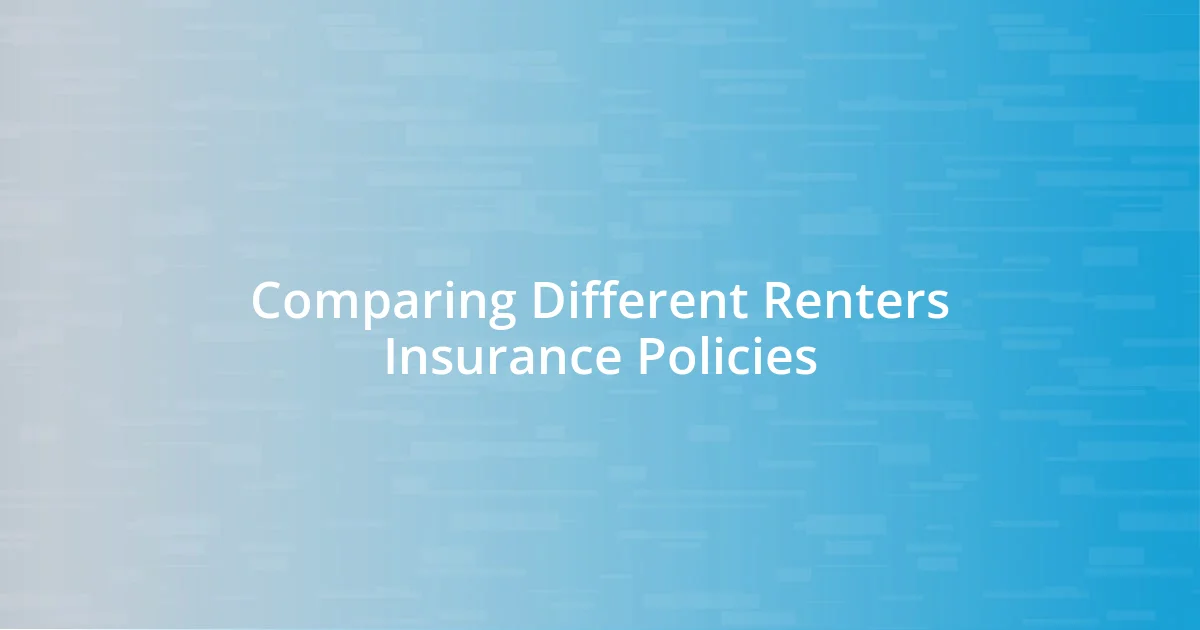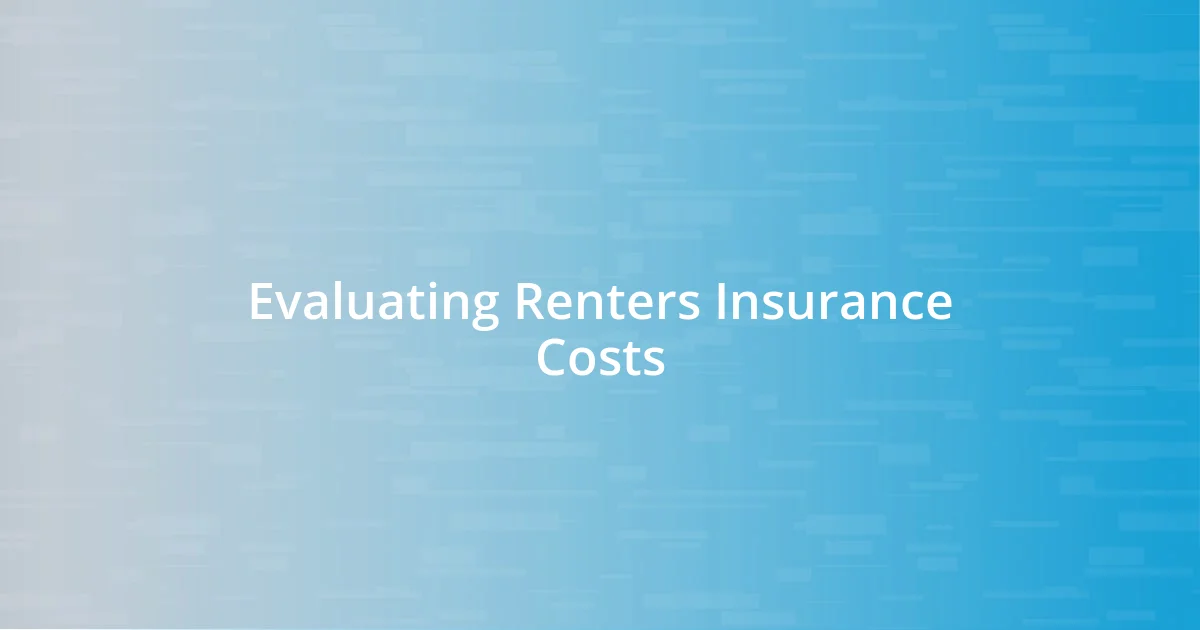Key takeaways:
- Renters insurance offers essential protections, including personal property coverage, liability coverage, and additional living expenses, providing peace of mind during unexpected events.
- Comparing renters insurance policies is crucial; features like replacement cost coverage and customer service quality can greatly influence your overall satisfaction and value.
- Common mistakes include underestimating personal belongings’ value, misunderstanding policy coverage limits, and neglecting to coordinate with roommates on insurance responsibilities.

Understanding Renters Insurance Benefits
When I first considered renters insurance, I was skeptical about its real value. But I quickly learned that it provides peace of mind knowing that my personal belongings—like my beloved guitar and favorite books—are protected against theft or damage. Isn’t it comforting to think that for a modest monthly premium, you can safeguard your cherished items?
One of the benefits that surprised me was liability coverage. Imagine if someone were to get injured in your rented space. The last thing you want is to face a costly lawsuit alone. With renters insurance, I discovered that it can cover legal fees and medical expenses, which relieved a lot of stress for me. It’s like having a safety net that I didn’t even realize I needed until I learned about it.
Furthermore, I was taken aback by how many people overlook the additional living expenses coverage. If a fire or flood forces you to stay elsewhere, renters insurance can help pay for temporary housing and essential needs. Doesn’t that sound invaluable? Knowing that I wouldn’t be stranded in a crisis feels like a warm blanket on a chilly day—truly a benefit worth considering.

Identifying What Renters Insurance Covers
Understanding what renters insurance covers opened my eyes to its true importance. Initially, I thought it was just about protecting my things, but there’s so much more. For instance, during a recent move, I unintentionally damaged a friend’s property. I felt terrible and worried about the financial repercussions until I remembered my renters insurance. It covered that incident, bringing me immense relief and reinforcing just how valuable these policies can be.
Here’s what renters insurance typically covers:
– Personal Property Coverage: Items like electronics, furniture, and personal belongings are protected against theft and damage.
– Liability Coverage: This protects you if someone gets injured in your apartment, covering legal fees and medical expenses.
– Additional Living Expenses: If your home is uninhabitable due to a covered loss, it helps pay for temporary housing.
– Medical Payments to Others: If guests are injured in your home, this coverage can help with their medical bills.
– Loss of Use: This can help cover lost rent if your landlord can’t rent out the unit due to damage.
Thinking back, this comprehensive protection doesn’t just safeguard assets; it also safeguards my peace of mind. I now realize that renters insurance is truly a lifeline when life takes unexpected turns.

Comparing Different Renters Insurance Policies
Comparing different renters insurance policies can feel overwhelming, especially with so many options out there. I recall standing in my living room, reviewing multiple policy documents with my coffee cooling beside me. Each policy had its own nuances; some offered higher personal property coverage, while others provided robust liability options. It was eye-opening to realize how even a small change in deductible could significantly affect my monthly premium. Have you ever compared quotes? It’s easier than it seems and can save you a good chunk of cash.
When comparing policies, I found that some companies included unique features, such as coverage for natural disasters or even identity theft protection. For example, I once had a conversation with a friend who had renters insurance that covered replacement costs rather than actual cash value. It’s such a game-changer! Instead of getting the depreciated value of my items after a theft, I would receive the amount it costs to replace them. This small but vital detail made me rethink what I valued in a policy.
Lastly, don’t underestimate the importance of customer service when choosing a renters insurance provider. It was a revelation for me when I learned that not all insurers offer the same level of support during a claim. I personally prefer working with a company that is responsive and has positive reviews from customers who have navigated the claims process. It makes a big difference knowing someone will be there for me when I need help. This made the comparison process way more enriching—I was not just looking for the lowest price but for the best value.
| Policy Feature | Company A | Company B | Company C |
|---|---|---|---|
| Personal Property Coverage | $20,000 | $25,000 | $15,000 |
| Liability Coverage | $100,000 | $250,000 | $100,000 |
| Deductible | $500 | $250 | $750 |
| Replacement Cost Coverage | No | Yes | No |
| Natural Disaster Coverage | No | Yes | Yes |

Evaluating Renters Insurance Costs
Evaluating renters insurance costs involves a delicate balance of understanding your needs and navigating policy features. When I first looked for coverage, I had a set budget in mind, but realized that the lowest premium often came with compromises. Have you ever experienced that sinking feeling when discovering that a low cost meant lower coverage? I certainly did, and it motivated me to dig deeper into the specifics of what each policy actually offered.
One practical tip I learned is to consider the deductible—the amount you pay out of pocket before your insurance kicks in. I remember grappling with a $1,000 deductible which seemed manageable until I suffered a small loss. Suddenly, that high deductible felt like a hefty hurdle. I’d say, look for a balance that suits your financial situation. I opted for a moderate deductible that allowed me to maintain a reasonable premium, while still providing ample coverage when the unexpected hit.
Another insight I gained was the value of bundling insurance policies. When discussing renters insurance with my agent, I learned that combining it with my auto insurance could yield significant savings. Isn’t it compelling to think about how simple decisions like these can lead to a more robust safety net without breaking the bank? With a little research, I now feel empowered to evaluate these costs and find a policy that not only fits my budget but also provides the coverage I’m truly comfortable with.

Claim Process for Renters Insurance
When it comes to the claim process for renters insurance, I can tell you firsthand that it’s vital to be organized. After experiencing a minor water leak in my apartment, I had to file a claim, and I quickly learned that having all relevant documentation—like photos and receipts—made a significant difference. Have you ever faced a situation where you wished you had kept better records? Trust me, a detailed inventory of your belongings can save you time and stress when you need to submit a claim.
The next step in the claims process is notifying your insurance company. I remember dialing the claims hotline feeling a mix of anxiety and anticipation. The representative on the other end was incredibly helpful—it felt reassuring to have someone guide me through the intricacies of the process. They walked me through the specific information they needed and made sure I understood the timeline of what to expect next. It’s moments like this when clear communication from your insurer can alleviate a lot of tension.
Finally, once the claim is submitted, the waiting game begins. I found it helpful to regularly follow up with my claims adjuster, checking in to see if any additional information was required. It’s worth noting that proactive communication often speeds things up. How reassuring it was when I finally received my claim payout, knowing that my insurance had my back during a stressful situation! If you ever find yourself in a similar position, stay engaged—having a constant line of communication can make the journey smoother and more reassuring.

Common Renters Insurance Mistakes
One of the most common pitfalls I’ve noticed with renters insurance is underestimating the value of personal belongings. When I first signed up for my policy, I casually calculated the worth of my things and quickly settled on a number. You might think a rough estimate is sufficient, but I learned the hard way that taking the time to itemize and assess the value of everything really pays off. Have you ever glanced around your home and thought, “Is that really worth more than I think?” Trust me, you’d be surprised at how quickly the costs can add up!
Another mistake people make is assuming that all their belongings are covered under a standard policy. In my experience, I encountered some exclusions I wasn’t aware of, like certain high-value items such as electronics or jewelry. This realization hit me when I had to file a claim for my laptop, only to find out it had a different coverage limit. Have you ever felt the frustration of realizing you could have easily made adjustments to your policy to safeguard those prized possessions? An annual review of your coverage can help clarify any potential gaps.
Lastly, neglecting to understand the implications of roommate situations can lead to major headaches. I once shared a place with a friend, and we assumed our separate policies would cover each of us adequately. However, when a break-in occurred, we discovered that without a named endorsement, my friend’s belongings wouldn’t be covered under my policy. Isn’t it a comforting thought to know how crucial it is to discuss and coordinate coverage options with housemates? Avoid these mix-ups by having open conversations about insurance responsibilities—it saves everyone potential stress down the road!
















